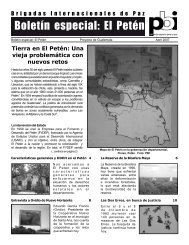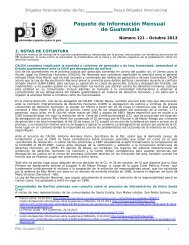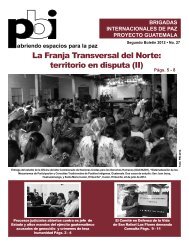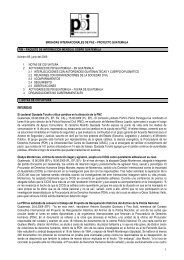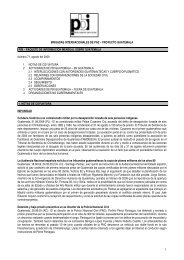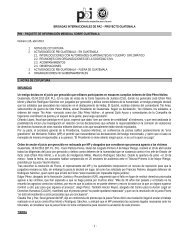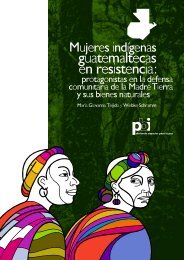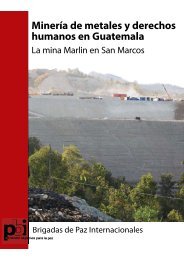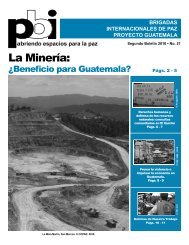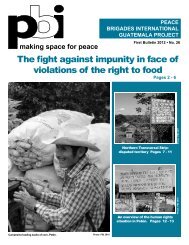The Northern Transversal Strip disputed territory (II) Photo
Bulletin 27 - 2nd of 2012 (pdf 1.4 MB) - PBI
Bulletin 27 - 2nd of 2012 (pdf 1.4 MB) - PBI
You also want an ePaper? Increase the reach of your titles
YUMPU automatically turns print PDFs into web optimized ePapers that Google loves.
PEACE BRIGADES INTERNATIONAL<br />
Brigadas Internacionales de Paz<br />
Other impacts on the environment, the local population and the<br />
social fabric in the area have been clearly identified and documented<br />
in different reports, journals, newspaper articles and<br />
communiqués from affected social organisations. <strong>The</strong> destruction<br />
of woodlands and rain forests, the large scale exposure of<br />
the woods to damage and deforestation, the alteration of the<br />
water basins and of the wildlife, the effects on the population’s<br />
crops or the benefits that this route brings for black market trade,<br />
are some of the impacts mentioned in the sources consulted in<br />
this article. In an interview with Mónica Velásquez, coordinator<br />
of the FGT in Barillas (Huehuetenango), commented in 2009<br />
she contacted the General Planning Secretary (SEGEPLAN)<br />
asking that the route of the road be presented to the inhabitants<br />
of San Mateo; as a result of the presentation and dialogue they<br />
managed to make some changes to the route of this stretch of<br />
the road, avoiding the most wooded areas of the municipality<br />
and facilitating its passage through a smaller number of inhabited<br />
centres than previously planned. However, according to<br />
Velásquez, no compensation was given to those that lost their<br />
farm land to the road construction and it became very complicated<br />
to negotiate with the planners due to the frequent change<br />
of the engineers responsible for the project 24 .<br />
In 2010, three years after SBI won the contract to construct<br />
the road, SEGEPLAN took over responsibility for investigating<br />
the social context of the project and the elaboration of an Integral<br />
Development Plan. Violeta Reyna Contreras, FTN plan<br />
coordinator at SEGEPLAN, assessed the project and identified<br />
various risks. She stressed that the expansion of large plantations<br />
of monocultures such as African palm and sugar cane<br />
represent an ever increasing threat to conflicts over land. She<br />
confirmed that, until now, the reactions to the project have been<br />
diverse, observing resistance to the construction of the road in<br />
various areas affected. According to Contreras, to secure the<br />
acceptance of a project like this, it would be important to develop<br />
a process of dialogue with the affected population, to secure<br />
good communication and allow time for the communities to<br />
seek conclusions and decisions 25 . In 10 of the 22 municipalities<br />
of the FTN, campesino and indigenous communities have organised<br />
and held popular and community consultations of good<br />
faith, as outlined in the Accord 169 of the ILO, demanding the<br />
recognition of the rights of the indigenous people to make decisions<br />
about the land on which they live. Despite the fact that<br />
a huge majority of people and communities that participated<br />
expressed their disagreement with mega projects involving mining,<br />
oil extraction and hydroelectric plants, the results of the<br />
consultations were not officially recognised by the state institutions.<br />
In spite of this numerous communities continue to follow up and<br />
articulate on the basis of the results of the community consultations.<br />
<strong>The</strong>re have been various community delegations which<br />
were received at Congress by the government authorities and<br />
congress members, where the results of the community consultations<br />
were officially presented and the position of the communities<br />
from various regions in the country, not only those that<br />
consider themselves affected by the FTN, made known.<br />
“… <strong>The</strong> population of our regions, who have not yet finished<br />
re-settling themselves on their land following the internal<br />
armed conflict, are again starting to be displaced for economic<br />
and commercial reasons in times of peace (…) Finally<br />
we want to make clear that our communities and our people<br />
do not want to negotiate, sell or concede our land, our water<br />
sources, our rivers and our mountains” 26 .<br />
<strong>The</strong> Committee in Defense of<br />
San’s Rafael Life <strong>The</strong> Flowers<br />
demands Consultation<br />
“After respecting the decision to hold a consultation, now the<br />
decision of the population is yet to be respected. In the Committee<br />
we have a particular understanding; we are not here<br />
to negotiate royalties or economic questions, nor to negotiate<br />
rights: our commitment is to defend the recognized rights and<br />
demand that they be respected.” Óscar Morales<br />
Initial contact between the Committee in Defense of Life of<br />
San Rafael Las Flores, Santa Rosa and PBI Guatemala project<br />
was made in October 2011. Since then, we have been attentive<br />
to the unfolding process of defending the <strong>territory</strong>. We are<br />
concerned by the threats and negative remarks denounced by<br />
the committee whose primary demand is for a municipal consultation<br />
with neighbours over the Oasis mining project located in<br />
El Escobal, two kilometres from San Rafael. In July 2012, we<br />
had the opportunity to meet with Óscar Morales, member of the<br />
Committee in Defense of Life to discuss the reality in which they<br />
are living in the process of peaceful resistance.<br />
24 PBI, interview with Mónica Velásquez, coordinator of the Fundación Guillermo Toriello in Barillas (Huehuetenango), January 2012.<br />
25 PBI, interview with Violeta Reyna Contreras, coordinator of the FGT, February 2012.<br />
26 Card submitted to the Office of the Human Rights High Commissioner in Guatemala (OACDNUDH) by the delegation of communities from the municipalities of Sacapulas, Cunén,<br />
Nebaj, Chajul y Cotzal, located in the northern part of Quiche, Guatemala, 12.05.2010. http://resistenciadlp.webcindario.com/pdf/B09.pdf<br />
8 Second Bulletin 2012 • No. 27



